Q&A Special: Pianist Barry Douglas | reviews, news & interviews
Q&A Special: Pianist Barry Douglas
Q&A Special: Pianist Barry Douglas
Raised in the Troubles, the Belfast performer who beats the Russians at their own game
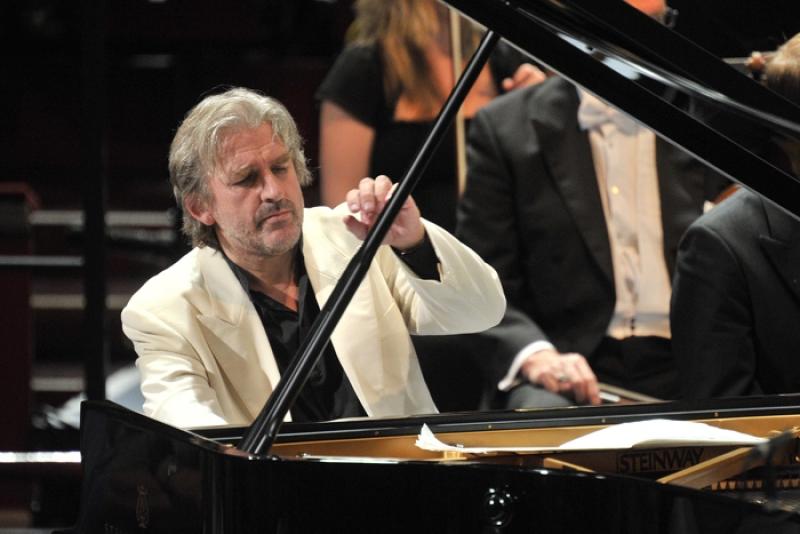
The Russians have always been particularly picky about the playing of the piano. Chief among the piano gods on the 20th century’s pantheon are Richter, Gilels, Horowitz - and even now names such as Ashkenazy, Kissin, Sokolov still elbow out many of the European and American names in the public consciousness. There remains a powerful mystique about Russian piano-playing.
But Russians told Barry Douglas he played like they did. He rejoined that, no, they played like he did (for which see more, below, to explain this interesting remark). It was the start of a global career for the Belfast man that takes him as often to play over there as to these islands.
However, this summer he has been in the UK, playing a new Kevin Volans concerto in the Proms, and he’s now embedded in a Beethoven complete piano cycle shared by five pianists at LSO St Lukes, the rebuilt Hawksmoor church in London’s Old Street that is now a prime BBC broadcast concert venue.
Sharing the cycle with Elisabeth Leonskaja and Khatia Buniatishvili, among others, to Douglas has fallen the massive Hammerklavier and the Waldstein sonatas, as well as gems such as Op 90 and 101. The private comes well to Douglas, who in person proves to be as reticent in manner offstage as he appears confident onstage.
Earlier this summer he returned to the Moscow Piano Competition, this time as a juror, on a judging panel assembled by Valery Gergiev. His Russian liaisons continue this autumn as he plays Rachmaninov with the Moscow Philharmonic in the UK, part of a remarkably busy year of playing great piano concerti by Brahms, Liszt, Saint-Saëns, Beethoven and Rachmaninov around the world.
He also founded and runs the Clandeboye and Castletown music festivals outside Belfast and Dublin respectively, all with the Irish orchestra he founded nine years ago, Camerata Ireland. He’s recording the complete Brahms for Chandos, has just recorded Penderecki and Nino Rota works, conducts more and more, and it would have taken no little character and persuasion to have Kevin Volans commissioned by the BBC Symphony Orchestra to write a concerto for them.
This is by any standards a hectic performing life, and one that reflects both Douglas’s popularity and his enormous breadth of musical interests - a very Russian breadth, really, as we discussed further when we met. But first Ireland, where Douglas, who was born in 1960, was growing up in a Belfast torn by bombs and sectarianism.
First - Ireland, where Douglas was growing up in a Belfast torn by bombs and sectarianism
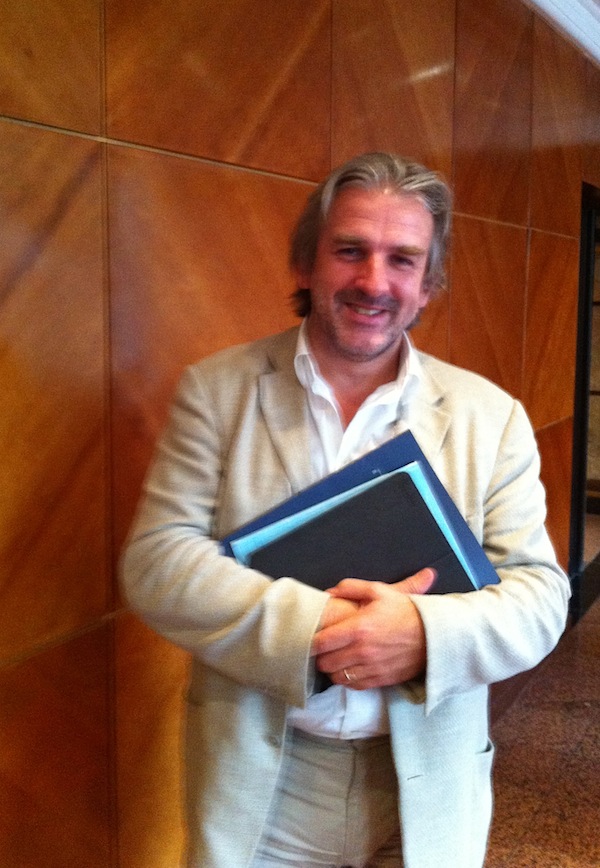 ISMENE BROWN: When you started as a boy in Belfast, how did it grow on you that you’d be a concert pianist?
ISMENE BROWN: When you started as a boy in Belfast, how did it grow on you that you’d be a concert pianist?
BARRY DOUGLAS: My first love was the clarinet and I wanted to be a clarinettist. The piano was just a tool that I played some things on. But through a chance meeting via my father I met Felicitas LeWinter, this woman who’d been a pupil of [Emil von] Sauer, who’d been a pupil of Liszt, and she came to visit her sister in Belfast when I was 16. I had some lessons with her and she inspired me to work on the piano. So I’m not like most pianists, playing Transcendental Studies when they’re one. I’m very, very late.
How did you learn such a sheer amount of technique as you needed in such a short time? You play so many of the largest concerti now, and you must have had to do a ferocious amount of work quickly.
Felicitas was fabulous. What I learned very quickly from her was that if you know what you want to say in the music, the technique will follow. Horowitz practised technique from playing music, not exercises. It was always that for me.
So not loads of scales and double octaves and arpeggios.
No. I was always just ravenous about learning more music.
In that period of the Sixties and Seventies, when the Russian pianists were travelling over, did they go to Belfast too? Sviatoslav Richter? Emil Gilels?
I had a couple of records of Richter and Gilels as a child. But growing up in Belfast at that time, where we had conflicts, we didn’t have a lot of visiting artists. But when I came to London I heard everything. The first concert I went to was Gilels at the Windsor Festival - he played three Beethoven sonatas.
I was there! At that very concert! I reviewed it for the Slough & Windsor Express. I think Op 90 was the most ravishing playing I'd ever heard.
I can remember even where I was sitting. September 1978. I’d just arrived at the Royal College of Music.
If you know what you want to say in the music, the technique will follow
Growing up in Belfast, with the troubles around, was it difficult to persist with this career in arts?
In most conflict situations life goes on. Actually in those days there was much more music going on than now, many more youngsters per capita involved in music than now. It was quite amazing - every Saturday there were bands, string groups, orchestras - I was the principal clarinet in a youth orchestra. No matter what background you came from, it was everyone just making music. Quite extraordinary.
Is that what’s in your mind in your deep involvement now in Belfast music-making? Founding the festival, your orchestra, the Camerata Ireland.
I think it’s one of the building blocks. The Camerata Ireland was more that I wanted to create something excellent that would show the world Ireland could be known for great classical music too, not just theatre and U2.
So you were 18 when you arrived in London. How did the musical life strike you at the Royal College?
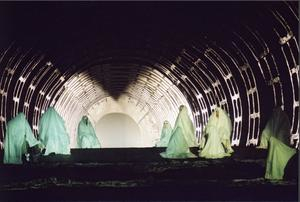 Again, because of my unusual musical appetites for a pianist, I went to operas all the time at first. Symphonies, opera, theatre. I couldn’t get enough. First thing I went to was the Götz Friedrich Ring at Covent Garden (pictured left), in the gods for a pound. A pound for everything.
Again, because of my unusual musical appetites for a pianist, I went to operas all the time at first. Symphonies, opera, theatre. I couldn’t get enough. First thing I went to was the Götz Friedrich Ring at Covent Garden (pictured left), in the gods for a pound. A pound for everything.
You were conscious that other pianists were only listening to piano, piano, piano?
I guess, coming from a place that had suffered and where not much was going on, I just wanted to take advantage of this Mecca in London. I didn’t hang out much with the pianists really.
How did you choose your teacher, John Barstow? [IB: He was my teacher too at the RCM]
I’d heard him play on Radio 3 and I liked the way he played, I thought I could learn something from him. So I asked for him.
What did you learn from him?
I think like me his tastes are very catholic, so he was as excited by a Mahler symphony as a Schubert piano impromptu. I learned a lot from him.
At some stage you thought, yes, I’m good enough, I’m going to go for it as a soloist?
I guess about two years into college I made the conscious decision that this was what I wanted to do properly, and not muck about. I was probably 20 or 21 when I decided that. [Douglas is now Prince Consort Professor of Piano at the RCM]
Did anyone’s work inspire you particularly?
Well… Kleiber, Giulini, Richter, Gilels, Barenboim as pianist or conductor - these were the ones I enjoyed the most in concert. And then through my teacher Maria Curcio, who knew Giulini, I’d go to all his rehearsals. And Barenboim’s rehearsals.
What was your first professional engagement?
My first was an organ recital when I was 11. I loved playing the organ. I did recitals in Belfast at Queen’s University, where they said I could play any time I wanted. And I was one of the young musicians in the Greater London Arts Association scheme, where you’d play all round London and it would be subsidised. It was great for experience. I don’t know if it exists any longer.
I was entirely in myself and just got up at 5 and practised two hours before school every day
So you had already discovered as a child that you were a performer. You hadn’t got any fear.
I guess, yes, it was second nature.
Was music something you did as a family? Did your parents say, “Barry, come and play?” Or did you use it as a personal place, a journey of your own?
I was entirely in myself and just got up at 5 and practised two hours before school every day - I got out of everything non-essential at school and thought only of one thing, me on the piano.
But you were good at other things at school?
Yes, very good with English and Maths. My school wanted me to do medicine and become a doctor…
Sometimes it’s like tempering the metal in the fire: if people say no, it toughens you. It’s tough being a professional musician, to fight for the gigs. You have to market yourself. They don’t tell you that at college.
I’ve always been quite single-minded. I try to keep negativity away from me. Giulini told me that on the day of a concert he doesn’t want to receive any mail, any notes, so he’s completely focused, in case something interferes, something happens that is negative. I’m a bit like that: I don’t go that far, but it’s not that you’re prissy or precious, but it’s important you protect your focus for the music.
I guess with such a large repertoire, that is hugely important: you have to switch quickly from one composer’s mind to another.
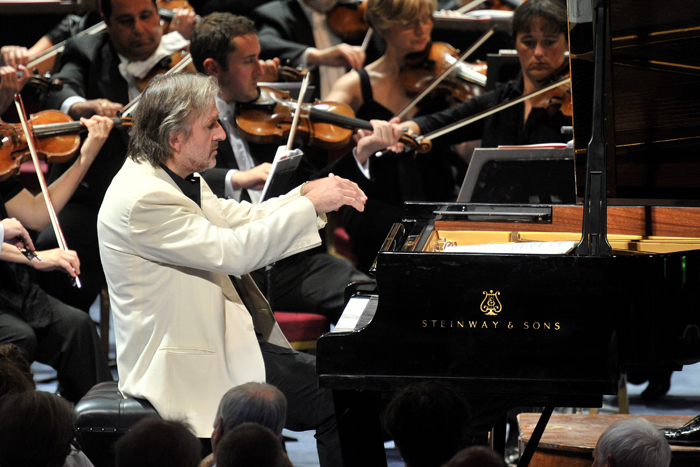 It’s always the case whatever you’re doing. You have to be unbelievably focused. For instance, doing the new Volans concerto in the Proms, not only is it very difficult to play, but you cannot stop counting. And I knew these promenaders were so close to me (pictured right © Chris Christodoulou) that if they distracted me, I just had to not stop counting. But they seemed to understand, they were so supportive at the front - I remembered that from previous Proms. They made it easy. You can see everything that goes on, right there, in the corner of your eye. Even if I’m playing a Brahms or Mozart concerto and someone does something, you have to say to yourself, it doesn’t exist, don’t lose focus.
It’s always the case whatever you’re doing. You have to be unbelievably focused. For instance, doing the new Volans concerto in the Proms, not only is it very difficult to play, but you cannot stop counting. And I knew these promenaders were so close to me (pictured right © Chris Christodoulou) that if they distracted me, I just had to not stop counting. But they seemed to understand, they were so supportive at the front - I remembered that from previous Proms. They made it easy. You can see everything that goes on, right there, in the corner of your eye. Even if I’m playing a Brahms or Mozart concerto and someone does something, you have to say to yourself, it doesn’t exist, don’t lose focus.
How did you come to enter the Moscow competition?
Someone had said I should enter the Santander competition (Spain), which I did in 1980, and I came second - no first prize was awarded. But it was great, I got a Spanish tour out of it. Then I entered the Cliburn competition (US) in 1985 and got third prize, and the next year I entered the Moscow.
Why? You were, what, mid-twenties? Moscow’s massive, every four years, it’s like the Olympics.
My agent at the time said, you should have a go, you won the third at Cliburn. I must say, I didn’t like competitions at all, and what it turned people into. It turned everybody around, into strange kind of automatons. I had a bad feeling about it. I entered the Moscow competition, but I didn’t buy a plane ticket until the last minute.
So I went. It was frightening. I played. I thought, who cares here? You played Bach prelude and fugue, Chopin study, one of the Tchaikovsky Seasons and a classical sonata. For the final you had to play Tchaikovsky 1 and another concerto - I did Brahms 1 - and you had to do them back-to-back. [The conductor was Vasily Sinaisky.]
Watch a short film made with Barry Douglas at the Moscow Competition in 1986
You must have beaten some Soviets.
This translator came to me after the first round and said, “Barry, get me tickets for the final, I think you’re going to win. You had the top marks for the first round.” So I felt, I’ve got a chance, I’ve got to start working till the finishing line.
Did you get a sense that the Russians particularly liked you? It’s been fairly rare from these islands over there.
Well, there’s a bit of a tradition. John Lill, John Ogdon, Peter Donohoe… [All three have won at Moscow, but shared their prize - Ogdon won in 1962 jointly with Vladimir Ashkenazy; Lill in 1970 shared first prize with Vladimir Krainev; in 1982 Donohoe shared second prize with Vladimir Ovchinnikov.]
Sometimes it’s as if pianists here are more contained, and to seize the big concerto by the scruff can sometimes seem a bit daunting. Big came naturally to you?
It’s not about “bigness”. It was a formidable Russian music education system. Second to none, and still is really, even if slightly diluted since the collapse of the USSR. Wonderful teachers.
What do they teach that’s not taught elsewhere?
Well, there are teachers all round the world now. It’s not really a system, as all the teachers are individuals. But it’s a complete conviction, a passionate commitment to the music, which means working very, very hard from a very young age. They’re very passionate people, and very melancholy people too.
It’s been forgotten that this poetic, lyrical Irish pianist might have influenced the Russians!
Did they come to you and immediately make you feel a relationship was being offered with the Russians that you’d like to develop? Or did you seek it from your end?
I never thought of it, it just happened. People said to me, "Barry, you play like a Russian pianist." I don’t know how that happened. They said, very similar sound, and so on. I’ve tried to think about it when I’m asked questions.
I pointed out at a Moscow press conference as a joke that John Field, a great Irish pianist-composer from Dublin, towards the end of his career went to live for a while in St Petersburg and taught a generation of Russian musicians - including Glinka. And before he became an alcoholic he went on to Moscow, where he is buried. So I told them, he brought the Bellini bel canto style of playing to the piano, that singing tone. So maybe I wonder if it’s been forgotten that this poetic, lyrical Irish pianist might have influenced the Russians! So maybe it’s they who play like the Irish!
Those early 20th-century Russian pianists were very lyrical, weren’t they, like Sofronitsky, Neuhaus. Maybe it was the Soviet creed, the political change, that cause this “big” thing to occur in the Russian pianism. Also those big halls, and huge new audiences.
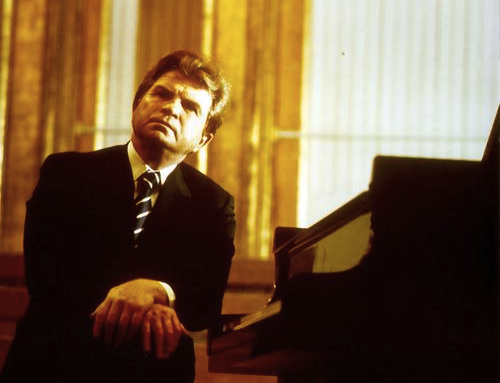 I think we limit the description if we just think of big. Certainly they often have a very big sound, but they have a kaleidoscope of sounds and touches, because they’ve developed their ears so sensitively and their sense of touch is so subtle. Being on the jury of the Moscow competition this year was eye-opening. I heard all these young Russian pianists, from a 17-year-old girl to a 30-year-old guy, who all played as if there was no tomorrow. Even if there were differences in balance and sensitivity, they all played as if there was no tomorrow. It was entirely amazing.
I think we limit the description if we just think of big. Certainly they often have a very big sound, but they have a kaleidoscope of sounds and touches, because they’ve developed their ears so sensitively and their sense of touch is so subtle. Being on the jury of the Moscow competition this year was eye-opening. I heard all these young Russian pianists, from a 17-year-old girl to a 30-year-old guy, who all played as if there was no tomorrow. Even if there were differences in balance and sensitivity, they all played as if there was no tomorrow. It was entirely amazing.
I ask about “big” because Emil Gilels (pictured above left) was a very determinedly “big” young player who developed into a remarkably subtle musician of tenderness and gossamer touch.
I think that all of the fire of the young pianist, certainly in the case of Gilels, remained, it never left. You still hear it, even in a soft, slow piece. He played the four ballades of Brahms, and in the first one, the D minor, it was like an organ - you can’t play it like that without the fire, it burned. How did he do that?
Watch Gilels play the D minor ballade of Brahms in Moscow's Tchaikovsky Hall
Yes, and as you say, that’s the product of the fantastic schooling, enormously dense training focus, as well as the talent. Did you have a mentor through your career?
I’ve had many. When I was about 23 or 24, I went for a while in Paris to a series of classes with Yevgeny Malinin, who was one of the big teachers in Moscow at the time. He had almost the same kind of sound as Gilels, and he taught me so much about sound. They knew all about weight, subtlety of touch, everything.
In your career, in terms of the rep you play, are you able to play what you want to - will they buy it? - or is it them telling you what their audience wants?
There are many ways to have a relationship with a presenter. But we’re all grown-ups and sometimes they ask for a piece and if it doesn’t work in your schedule you decline. Sometimes you’ll make an exception because they promise you next time you can do what you want. It’s a dialogue. Especially now - and many more people are compromising today.
Today, in a sense concert promoters are shyer of risk, aren’t they? But here you are playing this terrific range of concerti that lots of people want to book, but you’ve also done the Britten and the Volans, and you’re about to do the Beethoven sonatas. I wondered if you ever feel restricted - you’d like to play a rarer one, but they’d rather have Rach 2?
Every orchestra is different, you have a relationship with their managers or certain presenters, and you can say, “Have a go at this - I think you’ll like it.” But I never play something I don’t want to, it wouldn’t make sense. There are some pieces that maybe don’t like me… I won’t tell you which ones!
People who win a big competition often have burn-out because they don’t see ahead
How did your invitation to the jury of Moscow Competition this year come about?
Gergiev asked me. I’ve had many requests to join juries and I’ve always refused. But I thought, it’s 25 years since I won the Moscow, a good friend who runs the Cliburn was running it, so I knew it would be really well run. They were really trying to get it right, a small field of pianists, only 30, great jury members including Ashkenazy, Nelson Friere. I thought, I’ll do it just this once. And since then I’ve been flooded. (Douglas pictured below right at this year's Moscow Competition)
How do you think they got it “more right” this time?
Valery was very serious about this. That it seemed to be transparent, that it seemed to be expert, that we find a group of young talents who would do brilliantly and keep its reputation in lights. Because the competition had been going down a little bit in recent years. I knew if anyone could pull it off, Gergiev could. The winner was 20, Daniil Trifonov.
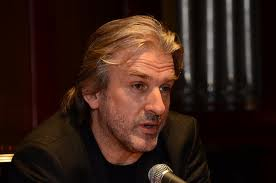 What will the competition this time do to his career?
What will the competition this time do to his career?
Ach! Well, he won I think in Warsaw last year, Tel Aviv in April and now this. So he’s sitting pretty.
It’s really important nowadays?
It’s one way of starting a career.
If your career has already started, how important is it to keep going to competitions?
It’s really a risky business. There was one pianist who’d had a prize in Moscow the last time, came back this time and didn’t get anything.
Is there some unspoken thing today that you have to keep boosting your career with competitions even when you’re already on the road?
I’d like to think it’s about being noticed in other countries, like America. The really big thing is what you do with your career after the competition. People who win a big competition often have burn-out because they don’t see ahead. They play a piece brilliantly and are asked to do it all the time. I had that after I won Moscow, and I really didn’t want to just play the Tchaikovsky all the time. I love it, but not all the time.
One thing’s sure, you must really be in love with it. If you don’t put in the hours it will never happen
The danger is what happens if you don’t get placed - what was seen as a rising career stalls. That is a big risk.
Yeah. It is a funny business. There is no surefire formula how to start a career or to sustain a career. But one thing’s sure, it’s a lot of hard work, you must really be in love with it, be passionate. If you don’t put in the hours it will never happen. It’s different now, but I did six to eight hours a day right up till I was in my mid-twenties. Now I play on average three to four hours a day.
So you weren’t going out with mates at all… no football or movies.
No, very boring.
Can I ask you now about the Beethoven cycle you’re about to do at St Luke’s? There are five other pianists involved - how did you share out the cycle? Did you put in secret bids?
I said what I wanted to play, and I got all of them except one. So I’m happy.
It’s three separate recitals - did you do the combinations yourself?
They suggested it and I was happy with it. There are broadcasting parameters [for the BBC].
Do you find the composer’s biography at all useful in playing Beethoven’s music across such a time span?
It’s good to read about the composers, absolutely, about the history and what was going on in the artistic time that they composed certain pieces. But ultimately it’s about the music and you must interpret that.
You’ll be playing other music in between each of the concerts?
Yes, I’m doing lots and lots of different things, I have my festival [Castletown] at the end of September, a tour with the Moscow Philharmonic, and I’m going to America.
Do you spend any time at home?
Yes, I block off big chunks every year. Most of December, most of February, all of July.
Yuri Bashmet [the violist] told me he’s on the road seven or eight months a year and his children just had to learn from early childhood that sometimes a thing is so important you need to do it.
It’s not an ideal family life, but I have a very understanding wife, and my children understand my life too. They came over for the Proms. My daughter’s 16, my boys are 14 and 13. They try to get to my concerts when they’re off school.
There are some great centres for string teaching, Cork and Dublin. I think it gives the orchestra a new sound
Your Irish festival you set up specially for the Camerata Ireland. What size is it?
It can be 18 strings up to 40, so it can play anything from chamber to symphonies.
Is it set up with a sense that you feel you owe one to Irish players, or is it an international band?
The unwritten idea was that it should be an Irish orchestra, for residents in Ireland, very loosely. It was to say, “Come on, guys, we’re pretty good. Let’s make an orchestra.”
What’s the violin teaching like in the Irish conservatoires, given the powerful folk fiddle playing?
There are some great centres for string teaching, Cork and Dublin. I think it gives the orchestra a new sound. There are many very talented young violinists now coming into classical music. To be a classical musician you have to have proper training. You can’t just switch from one to the other. I have some players who can also play Baroque instruments, others who are fabulous traditional violinists, but they’re all trained classically.
You’ve also been doing something with poetry and Stephen Rea.
It’s a six-day festival based around the life of Liszt, people whom he influenced and who influenced him. So of course I imagined Paris in the 1840s, and John Field was there, Chopin, Delacroix, Berlioz, Lamartine - everybody was in Paris. So I thought I’d try to recreate Paris for six days. So I thought we’d better have some poetry too, the Petrarch, the three sonnets, Victor Hugo, Dante of course, and Lamartine. All loosely on the theme of Liszt’s music.
This is the ninth year, I think - it’s a mini-Marlborough Festival in a way. Great artists come and work with 10-12 young professionals from all over Ireland, we all live together for six days and work together and have concerts in the evening. BBC Radio 3 comes. It’s at Clandeboye, Lady Dufferin’s estate, the most beautiful estate about 14 miles east of Belfast. We have a courtyard, a marquee, a banqueting hall. It’s the most beautiful estate you can imagine, grounds, very intimate, the youngsters mix with the older ones, no formality. The performances are formal, but not everything else. It’s the Camerata’s mini summer base - they play about 50 concerts as well. I love it - it’s a really nice time of year, everybody has a great time, we have picnics, family concerts, and it concludes with a banquet.
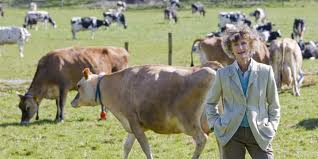 There are a lot of cows, prize cows, the most beautiful in the whole of Europe (Lady Dufferin pictured left with her cows). Lindy has her own yoghurt. It’s very special. And it’s a leading light in horticulture too, organic farming. It has two art galleries, and this is the music. And Lady Dufferin wants to create a legacy for the estate that will live on, that will make a difference to people’s lives.
There are a lot of cows, prize cows, the most beautiful in the whole of Europe (Lady Dufferin pictured left with her cows). Lindy has her own yoghurt. It’s very special. And it’s a leading light in horticulture too, organic farming. It has two art galleries, and this is the music. And Lady Dufferin wants to create a legacy for the estate that will live on, that will make a difference to people’s lives.
Is it the right size now or do you have further plans?
It ticks over beautifully. We could extend it further, but I don’t want to spoil its intimacy. It’s a little jewel. There's lots of aspects to this festival that people enjoy. As the artistic director you get a huge kick out of putting your own stamp on something, seeing people enjoying themselves. You draw people in and make them listen.
- Barry Douglas plays Beethoven sonatas on 22 September and 24 November at LSO St Luke’s, Old Street, London EC1. Other pianists taking part in the St Luke’s Beethoven cycle are Llyr Williams, Khatia Buniatishvili, Nicholas Angelich, Shai Wosner and Elisabeth Leonskaja
- He tours the UK playing Rachmaninov piano concertos with the Moscow Philharmonic 6-20 October, visiting Belfast’s Waterfront, Basingstoke’s The Anvil, Manchester’s Bridgewater Hall and Sheffield City Hall, and the Royal Festival Hall, London with the RPO on 23 October
- Camerata Ireland website for information, including on the Clandeboye and Castletown concerts
Buy
Explore topics
Share this article
Add comment
The future of Arts Journalism
You can stop theartsdesk.com closing!
We urgently need financing to survive. Our fundraising drive has thus far raised £49,000 but we need to reach £100,000 or we will be forced to close. Please contribute here: https://gofund.me/c3f6033d
And if you can forward this information to anyone who might assist, we’d be grateful.

Subscribe to theartsdesk.com
Thank you for continuing to read our work on theartsdesk.com. For unlimited access to every article in its entirety, including our archive of more than 15,000 pieces, we're asking for £5 per month or £40 per year. We feel it's a very good deal, and hope you do too.
To take a subscription now simply click here.
And if you're looking for that extra gift for a friend or family member, why not treat them to a theartsdesk.com gift subscription?
more Classical music
 Echo Vocal Ensemble, Latto, Union Chapel review - eclectic choral programme garlanded with dance
Beautiful singing at the heart of an imaginative and stylistically varied concert
Echo Vocal Ensemble, Latto, Union Chapel review - eclectic choral programme garlanded with dance
Beautiful singing at the heart of an imaginative and stylistically varied concert
 Scott, Irish Baroque Orchestra, Whelan, RIAM, Dublin review - towards a Mozart masterpiece
Characteristic joy and enlightenment from this team, but a valveless horn brings problems
Scott, Irish Baroque Orchestra, Whelan, RIAM, Dublin review - towards a Mozart masterpiece
Characteristic joy and enlightenment from this team, but a valveless horn brings problems
 Classical CDs: Voice flutes, flugelhorns and froth
Baroque sonatas, English orchestral music and an emotionally-charged vocal recital
Classical CDs: Voice flutes, flugelhorns and froth
Baroque sonatas, English orchestral music and an emotionally-charged vocal recital
 Kanneh-Mason, Britten Sinfonia, Shave, Milton Court - a grin and a big beaming smile
A pair of striking contemporary pieces alongside two old favourites
Kanneh-Mason, Britten Sinfonia, Shave, Milton Court - a grin and a big beaming smile
A pair of striking contemporary pieces alongside two old favourites
 theartsdesk at the New Ross Piano Festival - Finghin Collins’ musical rainbow
From revelatory Bach played with astounding maturity by a 22 year old to four-hand jazz
theartsdesk at the New Ross Piano Festival - Finghin Collins’ musical rainbow
From revelatory Bach played with astounding maturity by a 22 year old to four-hand jazz
 First Person: Manchester Camerata's Head of Artistic Planning Clara Marshall Cawley on questioning the status quo
Five days of free events with all sorts of audiences around Manchester starts tomorrow
First Person: Manchester Camerata's Head of Artistic Planning Clara Marshall Cawley on questioning the status quo
Five days of free events with all sorts of audiences around Manchester starts tomorrow
 Goldscheider, Brother Tree Sound, Kings Place review - music of hope from a young composer
Unusual combination of horn, strings and electronics makes for some intriguing listening
Goldscheider, Brother Tree Sound, Kings Place review - music of hope from a young composer
Unusual combination of horn, strings and electronics makes for some intriguing listening
 theartsdesk Q&A: composer Donghoon Shin on his new concerto for pianist Seong-Jin Cho
Classical music makes its debut at London's K-Music Festival
theartsdesk Q&A: composer Donghoon Shin on his new concerto for pianist Seong-Jin Cho
Classical music makes its debut at London's K-Music Festival
 Helleur-Simcock, Hallé, Wong, Bridgewater Hall, Manchester review - moving lyricism in Elgar’s concerto
Season opener brings lyrical beauty, crisp confidence and a proper Romantic wallow
Helleur-Simcock, Hallé, Wong, Bridgewater Hall, Manchester review - moving lyricism in Elgar’s concerto
Season opener brings lyrical beauty, crisp confidence and a proper Romantic wallow
 Kohout, Spence, Braun, Manchester Camerata, Huth, RNCM, Manchester review - joy, insight, imagination and unanimity
Celebration of the past with stars of the future at the Royal Northern College
Kohout, Spence, Braun, Manchester Camerata, Huth, RNCM, Manchester review - joy, insight, imagination and unanimity
Celebration of the past with stars of the future at the Royal Northern College

Comments
John Ogdon was co-winner of
Im waiting just now on the